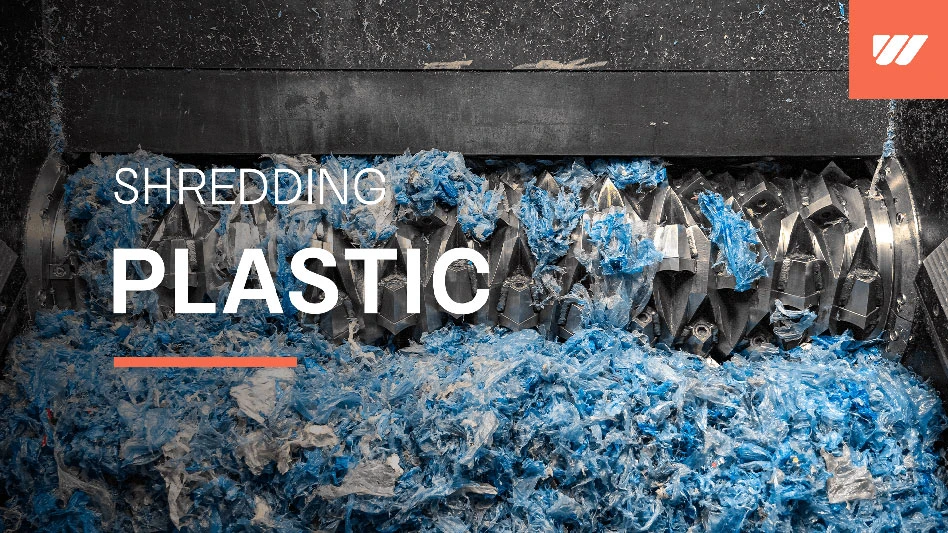
With the Trump administration’s newly imposed tariffs, implementation of the Ocean Shipping Reform Act of 2022 (OSRA 22) and a new partnership between two of the world’s largest container shipping lines, transportation and logistics has been front and center for recyclers.
To help recyclers and other stakeholders navigate this new landscape, Recycling Today hosted a Paper & Plastics Recycling Conference webinar in late January titled Transportation and Logistics. Joining moderator Nini Krever of Wilmington Paper Corp. of Pine Brook, New Jersey, was Carl Bentzel, formerly of the Federal Maritime Commission (FMC); Robyn Lyons of Maersk, which is headquartered in Denmark; and Karyn Booth, who is based in the Washington office of law firm Thompson Hine LLP, headquartered in Cleveland.
The panelists largely focused their discussion on the challenges related to ocean freight, highlighting port congestion, high delivery lead times, fluctuating rates and the potential impact of tariffs on the recovered paper market.
“Shipping a load of OCC [old corrugated containers] from North Carolina to Georgia is fairly straightforward; shipping multiple containers from New Jersey to Nhava Sheva, India, isn’t,” said Krever, who handles domestic and export paper transactions for Wilmington Paper. “Freight rates fluctuate, vessels don’t call the port as expected, the union threatens to go on strike, a snowstorm closes the ports. … These issues and more are what keep us up at night.”
Policy changes
Booth, who has been at the forefront of major policy proceedings before federal transportation agencies, including the FMC, and Congress, began her presentation by providing a bird’s-eye view of transportation markets and what policy changes could mean for the shipping industry.
With the new administration and majority Republican Senate, Booth said there’s “a big opportunity for meaningful change,” which likely could lead to some shifts in policy. With a strong agenda for deregulation across the government, she expected a reduced focus on climate and environmental justice.
Also, as outlined by Department of Transportation Secretary Sean Duffy during his Senate confirmation hearing, “red tape” that slows critical infrastructure projects will be reduced.
Further, OSRA 22—which grants the FMC authority to regulate ocean carrier practices, including investigating complaints about detention and demurrage charges—is scheduled to take effect this year. As of March 1, ocean common carriers are required to file documented export strategies with the FMC annually.
A major component of the legislation is unreasonable refusals, Booth said, which were important during the pandemic when fluctuating cargo volumes and port congestion created disruptions in shipping.
“Congress instructed the FMC to address this issue, and Congress itself adopted some prohibitions against unreasonable refusals for exporters and importers to get access to vessel space,” she said. “This rule applies only to the steamship lines, not middlemen such as NVOCCs [nonvessel operating common carriers]. It only applies to containerized cargo, not bulk cargo.”
Other updates in the ocean transportation space include the aversion of a second International Longshoremen’s Association (ILA) strike (The first strike was in October 2024 and lasted four days.) that had the potential to cause supply chain disruptions, demurrage charges for shippers and more, according to Booth.
On Jan. 8, the ILA and the U.S. Maritime Alliance reached a tentative agreement on a new master contract, including a 62 percent wage increase over six years. ILA members voted to ratify the agreement Feb. 25.
The agreement also allows for the implementation of new technologies, largely focusing on safety and efficiency.
“I think something that all importers and exporters want to see … is a promise of greater service reliability.” – Karyn Booth, transportation practice group leader, Thompson Hine LLP
Increased reliability
The operational collaboration between Maersk and Hapag-Lloyd of Germany, Gemini Cooperation, also focuses on reliability in ocean freight by creating a fleet pool of approximately 340 vessels with the combined capacity of 3.7 million 20-foot-equivalent-unit containers.
Booth described the collaboration as “more creative” and a means to change operations through a hub-and-spoke system.
“I think something that all importers and exporters want to see … is a promise of greater service reliability,” she said. “[Gemini Cooperation is] wanting, once they get up and running, to be up over 90 percent, which I think would be terrific for the industry.”
Lyons, who joined Maersk in 2016 and serves as head of strategic commodities, said the cooperation aims to reduce port calls on main liners by enhancing shuttle services and leveraging state-of-the-art hubs.
With seven east-west trade lanes and 57 services, 29 of which are mainline and 28 are shuttle, Lyons said recovered paper exporters and customers should begin seeing fewer pain points over the next six months to a year.
“We will have a leaner mainland rotation, with two to three ports per region, including strategic hubs,” Lyons said. “The intention behind that is that with less port calls and with having a little bit more intention on the ports that we’re calling, it will aid in our service reliability improvements and transit time improvements.”
Overall, this could result in shorter round-trip voyage times and fewer sources of disruption, she said.
Lyons also noted the possibility for legislation that could affect ocean freight, such as the European Commission’s new rules that are intended to decarbonize the maritime industry.
The FuelEU Maritime Regulation sets a requirement to lower the greenhouse gas (GHG) intensity of the energy used on board by all ships above 5,000 gross metric tons calling at European Union ports, regardless of the point of origin. The regulation gradually will increase the annual average reduction in GHG intensity over time, starting from -2 percent in 2025 to -80 percent in 2050 compared with the average in 2020.
“This regulation incentivizes the use of renewable, lower-emissions fuels, which is something Maersk has been … very engaged in,” Lyons said. “As the limits for the yearly average GHG intensity of the energy used by ships decrease, the cost of compliance will increase gradually.
“This is something we’ve worked together with our customers to implement and roll out, and it has been in place since the start of this year through several published surcharges that are either made available via our tariffs and also through our contract products that we negotiate and enter into with our customers.”

Challenges ahead
Bentzel—formerly FMC commissioner and current president of the Washington-based National Association of Waterfront Employers—said ocean freight still is mending from impacts of the pandemic.
“I knew we were in trouble when the meeting shifted from logistics managers to CEOs of companies,” he said of his time heading the FMC in 2020. “We essentially saw during the early part of the pandemic a reduction of about 20 percent of our containerized cargo coming into U.S. ports.”
With CARES Act assistance along with economic changes, cargo coming into the U.S. increased by 30 percent, an influx that created port congestion and, ultimately, contributed to rising inflation in the U.S., according to Bentzel.
“It was a market that swung indescribably, and it was a challenged, constrained environment that was faced with responding to those market pressures,” he said. “The result is trillions of dollars of added cost to most consumers and users of the system, but it really shifted the focus on how important the industry is.”
Legislation such as OSRA 22 has embolden the FMC to be more proactive, Bentzel said, adding that the Trump administration shouldn’t affect its agenda.
The Office of the U.S. Trade Representative has continued the Section 301 trade investigation the FMC prompted under the Biden administration, which is evaluating Chinese manipulation and market control of shipbuilding. China manufactures about 98 percent of shipping containers, 80 percent of shipping intermodal chassis and almost all ship-to-shore cranes handling cargo, he said.
Another topic of conversation was earliest receiving dates delays, which have been exacerbated by the Red Sea shipping crisis. Bentzel said solutions require real-time data shippers need for scheduling services, transit reliability and harmonizing cargo systems at marine terminals.
“We need a system of better communication, and there’s a role for shippers ... in this, as well, in terms of telling carriers when they’re going to need services [and] better forecasting materials,” he said. “We have to do better on this across the board—that is carriers, terminals, railroads, trucking companies, shippers.”
Get curated news on YOUR industry.
Enter your email to receive our newsletters.

Explore the April 2025 Issue
Check out more from this issue and find your next story to read.
Latest from Recycling Today
- Nickel carbonate added to Aqua Metals’ portfolio
- EuRIC, FEAD say End-Of-Life Vehicle Regulation presents opportunity for recyclers
- Recyclers likely to feel effects of US-China trade war
- BCMRC 2025 session preview: Navigating battery recycling legislation and regulations
- Yanmar Compact Equipment North America appoints new president
- LYB publishes 2024 sustainability report
- Plum Creek Environmental acquires Custom Installation LLC
- Avis introduces Harris American Co.






